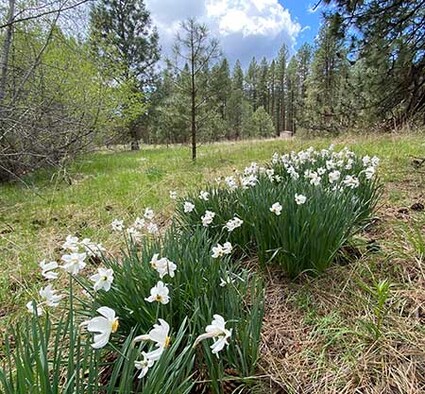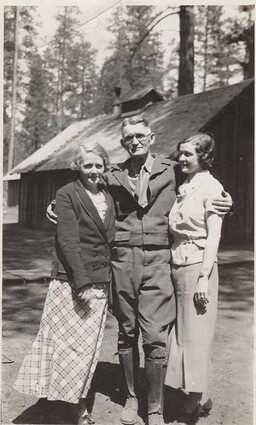Perry South first ranger of the Metolius
Last updated 5/31/2022 at Noon
When people hear the name Perry South they often think of a remote and scenic campground on the shores of Lake Billy Chinook with boating, eagles, and a few rattlesnakes. Some even ask, “Where is Perry North?” But the name honors a special ranger who began his work on the banks of the Metolius River in the old Allingham Ranch house in 1906, in the earliest days of the Forest Service. He went on to serve in Sisters for over 20 years, longer than any other ranger to this day.
Perry South was born in the Willamette Valley, and helped his father settle a homestead in the dry high desert of Grandview in 1895, an area that boomed for a while as many waited on the scheme of bringing irrigation water from Suttle Lake. He met and married Leda Graham of the pioneering Graham Family, who managed a welcoming ranch and small mill close to Black Butte, near the main wagon road.
He arrived at the old Allingham Ranch house in 1906 at the mature age of 30 to begin his duties as a forest guard, then assistant, and finally forest ranger of the Metolius Ranger District, which was later combined with the Sisters Ranger District. In a time when rangers were moved around to avoid becoming too attached to any one community or permittee, Perry South was kept close, serving on the Metolius, Sisters, and Crescent Ranger Districts.
It was a tough and primitive life living in the guard station along the river. He brought his bride, Leda, to Allingham, and went to work on the business of the new National Forest. They soon welcomed their first child, a bright-eyed girl they named Jesse, who sadly died when she was about a year old. Daughter Ruby and son Marion were born at Allingham in 1909 and 1912, and their second son Carl was born in 1915 during Perry’s time in Crescent.
Perry was described as a quiet man of smaller stature, but with a big reputation and well respected.
People listened when he talked.
He was strong too, often fighting early wildfires with little help and was known as a powerful wrestler.
In 1927, he led a challenging winter search for lost mountaineers in the Three Sisters.
In other heroics, he is credited with saving the Sisters Hotel, now Sisters Saloon, from a wildfire that destroyed much of town in 1923, by directing ladies to hang damp sheets out the hotel windows.
In 1932, the Bend Bulletin described him as “one of the most popular and well-liked forest officials in this part of the state.” He even built his own new ranger station in Sisters with two assistants, in 1925.
His sons grew up tending sheep herds in the Cascades and went on to work the ranch Perry and Leda bought on Fly Creek in 1925.
During the Great Depression of the 1930s, President Franklin D. Roosevelt established several New Deal programs, including the Civilian Conservation Corps or CCC, which was meant to stabilize the economy and provide work in environmental conservation.
Perry accepted the challenge of building the CCC Camp Sisters on the Metolius (today the site of Riverside campground), and keeping hundreds of young men busy, improving recreation facilities and infrastructure.
Those rustic log picnic shelters along the Metolius and at Suttle Lake are CCC handiwork.
The biggest challenge might have been the 1933 Black Butte Tower construction.
It required over 1,000 loads of timbers and materials on pack horses.
The new tower greatly improved fire detection for the city of Sisters and areas east.
Perry oversaw these projects as well as his regular workforce.
One of his final official appearances was at the dedication of Timberline Lodge in 1937, where eight of the most respected rangers in the region were invited to welcome President Roosevelt and his wife, Eleanor. The rangers were in full uniform, mounted on horses, with a company of young men of the CCC, one of Roosevelt’s most successful programs.
Perry retired and went back to work on his Fly Creek Ranch with his sons, raising sheep. In his spare time both he and his son Marion were Jefferson County commissioners. The Souths were known as a kind and generous family who hired and supported two destitute teens, Red and Bill Nance. Years later Red Nance ended up buying the ranch and installed a memorial sign at the entrance commemorating the South and Nance families. The sign is still there today if you venture out to the remote Fly Creek country of the lower Metolius.
His beloved wife, Leda, died at the age of 60 and at some point the ranch was leased to his sons. Perry spent his last years living with his daughter Ruby in Portland. After a life in the forests and open spaces of his desert ranch, he must have longed to get out of the rain and back into dry wild country. When he passed away in 1955 at the age of 79, they brought him home to the eastside and he was buried next to Leda and his little daughter Jesse at Camp Polk Cemetery in Sisters.
The Souths’ Fly Creek Ranch house burned to the ground in the late 1980s and the old Allingham Ranger Station was torn down, although fire crews lived and worked from the adjacent cookhouse for many years until it too was removed a few years ago.
Today the only trace of Perry South’s first ranger station is a bit magical. The house is long gone, but each May, a raft of narcissus bulbs spring into bloom where they were carefully planted by a ranger’s wife, maybe even Leda South, long ago. And Perry South is remembered as a remarkable public servant, who stayed relevant as the world changed around him and gave his all for the family and the forests he loved.













Reader Comments(0)